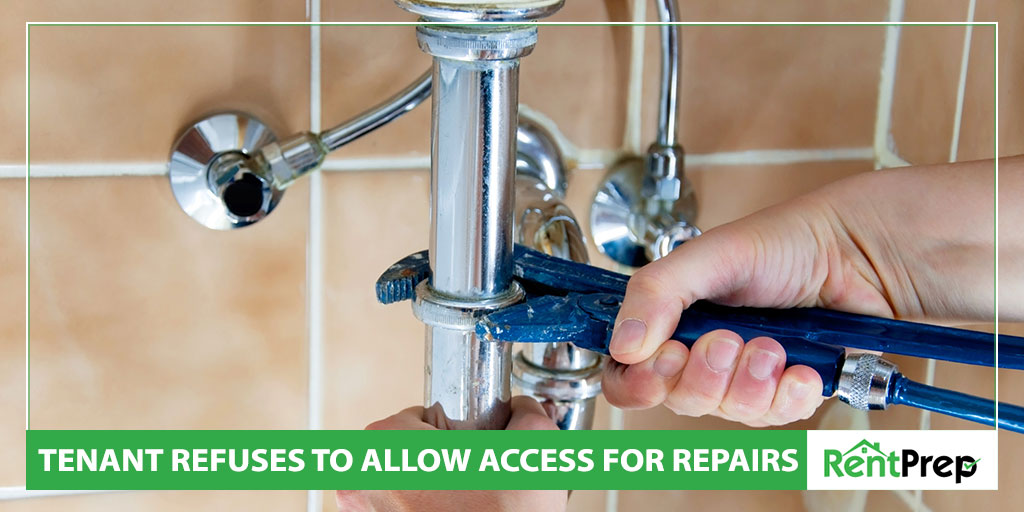
There will be times when repairs need to be done to your rental properties. Sometimes, these repairs can wait and be done whenever the property is vacant. At other times, however, the repairs will be more urgent and need to be done immediately.
What do you do when the tenant refuses to allow access for repairs? Can a tenant refuse entry to the landlord, or is there a way you can ensure the repairs are completed despite their refusal?
Most landlords know they cannot simply enter a rental property whenever a tenant is living there, but understanding the exact guidelines is key. Should a tenant refuse access, you need to know what is within your rights to manage your property successfully.
This topic can make your job easier if you have a good grasp on the rules and laws that apply. Today, get up-to-date on those guidelines!
A Table Of Contents For When A Tenant Refuses Access
- Accessing The Property: Landlord And Tenant Rights
- What To Do When A Tenant Refuses Access To The Landlord
- Reminder: The Effects Of Local And State Laws
- FAQs: Tenant Refuses Access To The Landlord
Accessing The Property: Landlord And Tenant Rights

The root issue at the core of a tenant allowing or denying access to the property can be found in the landlord-tenant relationship. Both the landlord and tenant have specific rights to the property, and the issue of accessing the property is affected by those rights.
While landlords have a right and obligation to be able to access and repair the property as needed, tenant’s also have a right to use the property as they see fit at any time without interruption. How can these two conflicting interests be managed?
Access For Repairs
Landlords have a right to access the rental property, with notice, for repairs. This means that as long as you give the appropriate notice and work with the tenant to reasonably schedule the repairs, they must allow you this type of access.
Access For Showings
Similarly, you need to be able to market the property whenever your tenant’s lease is ending and you want to find a new tenant. While you can wait to do this until the property is vacant, it’s often in the best interest of your business to do this before the current tenant moves out.
With appropriate notice, it is within your rights to request this type of access to the property. The tenant has a right to request the date or time to be moved if it is not conducive to their plans, but they must allow reasonable access.
Access For Inspections
Finally, it’s reasonable for landlords to be able to inspect their properties at specific times. Some landlords do six-month inspections while others stick to yearly inspections. These inspections are done to ensure there are not any repairs that need to be addressed sooner rather than later.
There might even be cases where the landlord needs to have a specialist like an engineer or a plumber come in to plan future work. If they need to inspect certain areas of the building, you are within your rights as landlord to ask for access with the appropriate notice.
Tenant’s Right To Privacy
The best way to make sure both parties are on the same page and understand their rights is to put the various types of access permissions into the rental agreement.
What To Do When A Tenant Refuses Access To The Landlord
Situation 1: Tenant Refuses To Allow Access For Repairs
Sometimes, a tenant will not understand why you want to access the property either directly or indirectly through a contracted worker to make repairs. Tenants that requested the repairs are less likely to be bothered by this maintenance, but repairs you are choosing to do of your own accord may be more difficult to explain.
You should only try to do repairs that must be done sooner rather than later while a property is occupied. If the repair can wait without causing any damage, it should be held off on.
Otherwise, you have a right to access the property with the appropriate notice. If the tenant refuses, you are permitted to send them a notice to agree or quit the property. The tenant refusing you access constitutes a breach in the lease agreement, so they could be evicted if they continue to deny access.
Situation 2: Tenant Refuses To Show Property For Inspection

If a tenant wants to continue to rent from you past one year or simply through the rest of their lease agreement, they need to allow access for your yearly or semi-annual property inspections.
It is within their rights to request a new time and date that fits their schedule, but they cannot outright refuse to allow you to do an inspection. If they continue to refuse to do an inspection after you point this out, you may send them a notice to comply or quit the property as the beginning of the eviction process.
Situation 3: Tenant Refuses To Allow Showings
If a tenant is not thrilled at the idea of having strangers in their home while you are showing the property, you can proceed in a few different ways:
- Send them a copy of the lease as a reminder of what your rights are as a landlord.
- Send them a notice to allow covenant or quit the property.
- Wait until they move out.
As you’ve read with the refusal for inspection and repairs, sending notice and forcing the tenant to allow access can cause a lot of stress and strain for both parties. If it will not hurt your business to do so, it might be best to wait until the tenant moves out to show the property if they are uncomfortable with the showings.
Reminder: The Effects Of Local And State Laws
Often, the final call about what is and what is not permitted when a tenant refuses to let their landlord in is the state and local laws in effect. These laws usually outline how much notice a tenant must be given and what the terms of notice are.
Be sure that you always follow your local laws most closely as those are the laws that will prevail if challenged during a landlord-tenant hearing.
FAQs: Tenant Refuses Access To The Landlord
Can A Tenant Refuse The Landlord Entry To Make Repairs?
The tenant can only refuse the landlord entry for repairs if the repairs are non-essential repairs that can be postponed until after the tenant moves out. If the repairs are urgent or need to be done before the tenant moves out, the tenant will need to allow access.
When Can You Legally Enter After A Tenant Says No?
Legally, you have a right to access the property as long as you give the appropriate notice, but you should not enter until the tenant has agreed to avoid any further disagreements. The only time that you should enter the property despite tenant denial is when there is an emergency.
For example, you can enter the property to ensure that a flood in another unit did not affect the integrity of this unit. Emergency situations are exceptions to the rules.
Finally, most states have provisions that allow landlords to enter the property if the tenant has not been there in more than seven days to ensure that everything is alright.
Is It Legal For Maintenance To Enter An Apartment Without Notice?
The only time that maintenance, a property manager, or a landlord can enter a unit without notice is during an emergency situation. If a fire or flood is ongoing, for example, the unit may be entered.
For all other types of access, courtesy notice should be given to the landlord.
How Do You Deal With A Stubborn Tenant That Prefers Privacy?
Sometimes, you will encounter a tenant who simply prefers privacy and doesn’t want to have others accessing their space very often. Even if they are good tenants, this might just be how they prefer to live.
In those cases, talk to the tenant about how they would like to go about giving you access to the property. It might be better for them if you schedule all upcoming appointments and repairs in one or two days so you can get it out of the way at one time. Other tenants might prefer you schedule the visits when they will be home to monitor the property.
Ultimately, the best way to work through this situation is by communicating with the tenant.
Limited Access Is Permitted
The bottom line is that when a tenant refuses to let their landlord in, that is not always the final word on the situation. Though primary access to the property is signed over to the tenant through the rental agreement, you still have a right to limited access.
As long as you are following the rules for this access by sending the appropriate amount of notice and following the time limitations, tenants cannot deny access for:
- Repairs
- Inspections
- Showings
The best way to prevent issues with access is to ensure you have detailed information about when and how landlords may access the property in the lease agreement. Both parties can review and discuss the information before signing to prevent future miscommunications.

